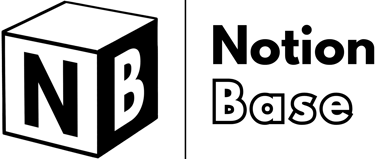NOTION SYSTEMS LAB — PRE-ORDERS END FEBRUARY 22 — 50% OFF BEFORE DOORS CLOSE
Obsidian vs Notion: Which Note-Taking App is Right for You?
Obsidian and Notion are two popular tools in the world of digital note-taking and productivity. This article compares Obsidian vs Notion, examining their functionalities, user interfaces and collaboration features to help you decide which one is right for you.
2/8/20256 min read
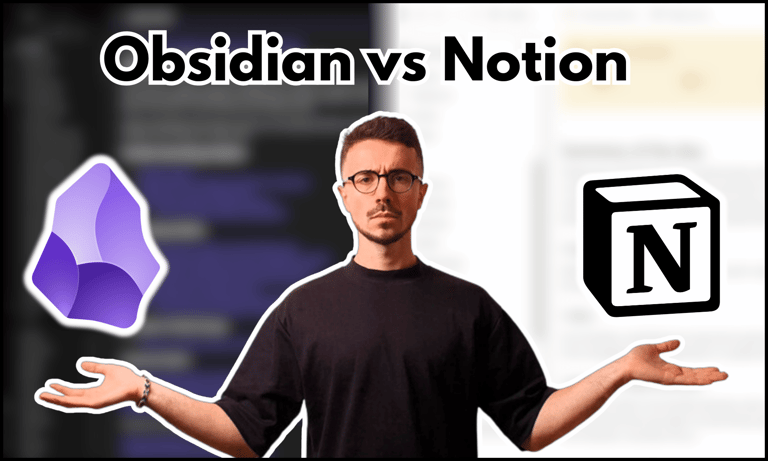

Obsidian vs Notion
In the world of digital note-taking, two powerful tools stand out: Obsidian vs Notion. Both offer unique features tailored to different user needs, making the choice between them a challenging one.
Whether you’re a student, a researcher, or a productivity enthusiast, understanding their differences will help you decide which tool best fits your workflow.
Table of Contents
Overview: What Are Obsidian and Notion?
Before diving into the comparison, let’s briefly introduce both tools and their core philosophies.
What is Obsidian?
Obsidian is a markdown-based note-taking application designed for local-first, linked knowledge management. It allows users to create a personal knowledge base through bidirectional linking and graph visualization. It supports both light and dark mode for a customizable user experience.
Since all files are stored locally, users retain full control over their data, making it an excellent choice for privacy-conscious individuals.
What is Notion?
Notion is an all-in-one workspace that combines note-taking, task management, databases, and collaboration tools. It offers a flexible block-based system that allows users to customize their workspace to fit various needs. Notion also supports both light and dark mode to enhance usability.
Unlike Obsidian, Notion is cloud-based, meaning users can access their notes from any device with an internet connection. This makes it a strong option for teams and individuals who prioritize accessibility over local storage.
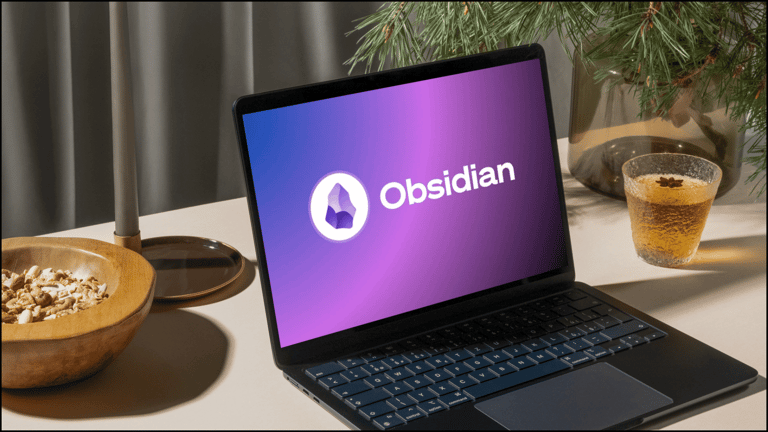

Obsidian vs Notion: Key Differences at a Glance
Obsidian focuses on local storage, privacy, and deep knowledge linking, whereas Notion excels in cloud-based collaboration and structured organization.
Obsidian is ideal for personal knowledge management, while Notion is great for team-based productivity and personal organization.
Notion integrates seamlessly with databases, while Obsidian provides advanced linking capabilities for networked thought.
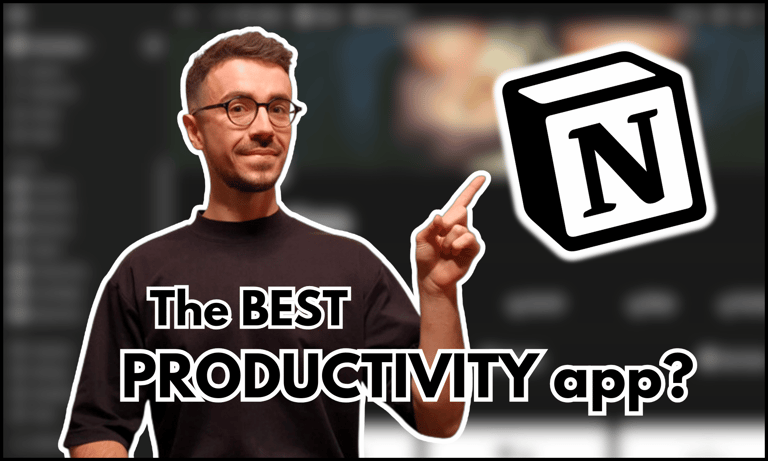

Read this article to learn more about what is Notion.
User Interface and Experience: Obsidian vs Notion
The way an app feels and functions significantly impacts productivity. Let’s compare their interfaces and ease of use.
Obsidian’s Interface
Obsidian offers a minimalist markdown editor. It is highly customizable with plugins and themes, supporting multiple panes for side-by-side editing. The ability to toggle between light and dark mode allows users to adapt the interface to their preferences.
The graph view is one of Obsidian’s standout features, providing a visual representation of how notes are interconnected, helping users build a network of knowledge over time.
Ease of Use: Obsidian vs Notion
Obsidian requires a learning curve due to its markdown-based approach and plugin reliance. Notion offers an intuitive drag-and-drop experience, making it an excellent tool for users who want a seamless way to organize tasks, notes, and projects in one place.
However, Notion’s flexibility can sometimes lead to decision fatigue, as users may struggle to decide on the best structure for their workspace.
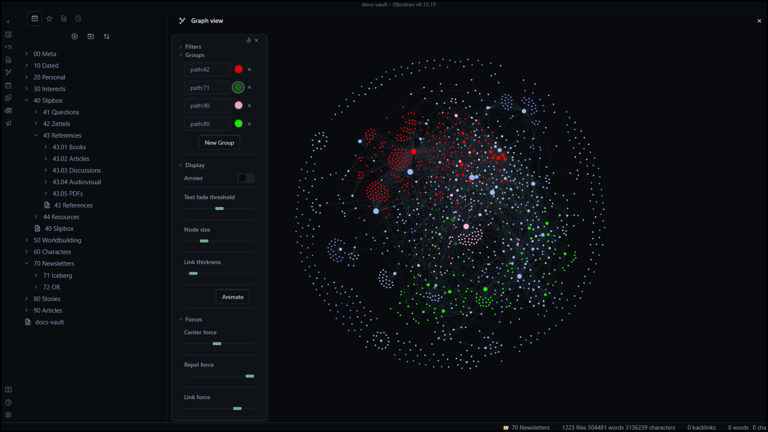

Notion’s Interface
Notion provides a clean and modern block-based editor. It features drag-and-drop functionality for easy organization and database integration for structured content management. The dual light and dark mode functionality enhances readability for different environments.
Unlike Obsidian, Notion's UI is more structured, making it particularly useful for task management, project planning, and life organization in general.
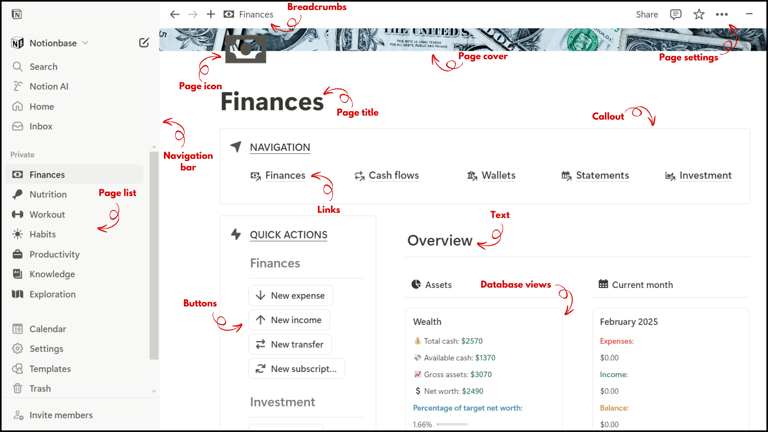

Features and Functionality: Obsidian vs Notion
Each tool offers a rich set of features that cater to different workflows.
Note-Taking Capabilities: Obsidian vs Notion
Obsidian supports pure markdown, backlinking, and graph view for networked thought.
Notion utilizes a block-based editing system, which allows users to integrate text, tables, and media seamlessly.
Knowledge and Personal Organization: Obsidian vs Notion
While Obsidian is great for Zettelkasten-style note-taking, Notion shines in personal organization. With its structured wikis, task-tracking features, and linked databases, Notion helps users create a well-organized digital workspace.
Whether planning daily tasks, managing long-term goals, or building a personal knowledge base, Notion provides a seamless way to keep everything in order.
Pre-built Notion templates are available for habit tracking, journaling, goal setting, and project planning. This makes it an ideal choice for individuals looking to streamline their workflow without having to build their own system from scratch.
Obsidian, on the other hand, is preferred by those who need deep connections between notes, making it an excellent tool for researchers, writers, and knowledge workers. With its backlinking feature, users can create complex networks of ideas that allow for deep exploration of topics over time.
Offline and Cloud Access: Obsidian vs Notion
Obsidian is a local-first tool with optional sync, ensuring full access even without an internet connection.
Notion, being a cloud-based platform, allows access from anywhere but has limited offline capabilities (for now).

Learn more about Notion here.
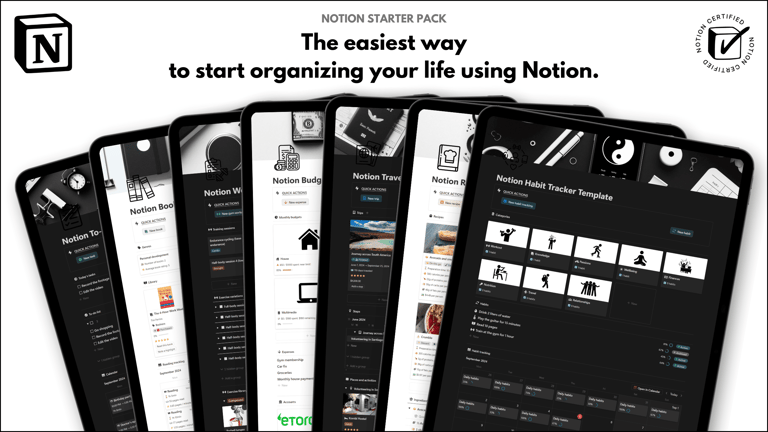

Save hours building from scratch!
Get instant access to 7 free Notion templates with the Notion Starter Pack.
Collaboration and Team Workflows: Obsidian vs Notion
Collaboration is a crucial factor for many users. Let’s see how Obsidian vs Notion compares in this regard.
Collaboration in Obsidian
Obsidian is primarily designed for individual users. It lacks built-in real-time collaboration features, and syncing across devices requires a paid plugin. However, some users use GitHub or third-party sync solutions to enable team workflows.
Collaboration in Notion
Notion excels in collaboration, offering real-time editing, commenting, and shared workspaces. Role-based access control allows for managing permissions efficiently. Team members can simultaneously edit documents, track progress in shared dashboards, and communicate within Notion’s ecosystem.
Best for Teams or Individuals? Obsidian vs Notion
Obsidian is best for solo knowledge management.
Notion is ideal for both personal organization and collaborative workspaces.
Pricing and Value for Money: Obsidian vs Notion
Budget considerations can play a significant role in choosing a note-taking app. The prices displayed below are for monthly payments but can be reduced with annual subcription.
Obsidian’s Pricing
Obsidian is free for personal use.
Obsidian Sync costs $5/month for cloud sync.
Obsidian Publish costs $10/month for public sharing.
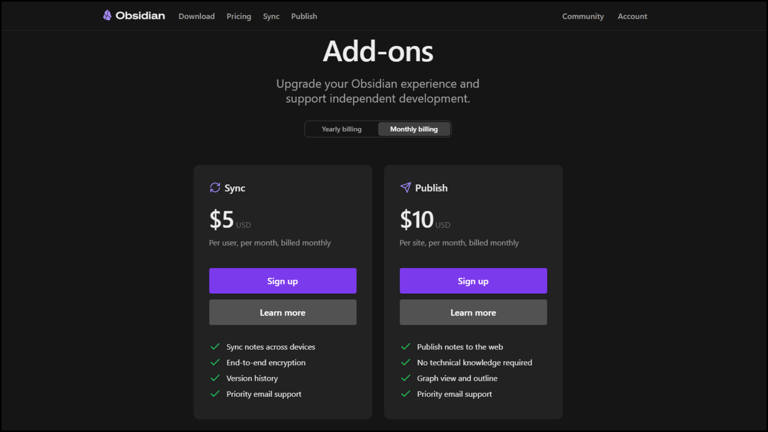

Notion’s Pricing
Notion offers a free plan with limited features.
The Personal Pro plan costs $12/month for advanced features.
The Team plan is $18/user/month for collaboration tools.
Best Value for Your Needs: Obsidian vs Notion
Obsidian is cost-effective for personal users who prefer local storage. Notion is worth the price for those who need a robust organizational tool with collaboration features and database management.
If you work solo and need long-term knowledge retention, Obsidian is the better choice. However, if you work in teams or need structured organization, Notion is the more versatile tool.
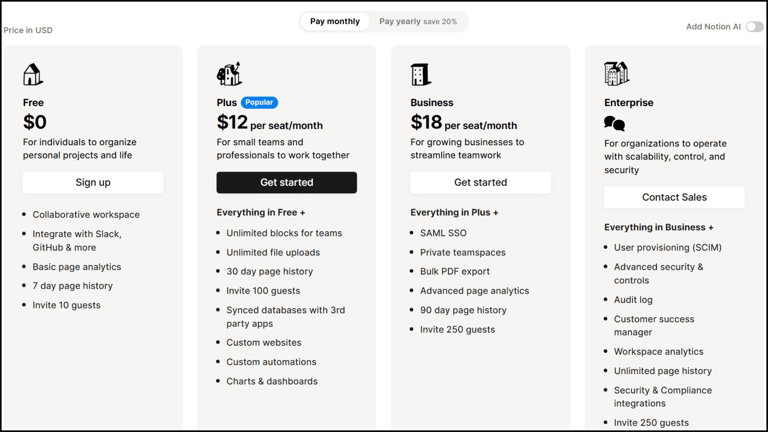

Conclusion: Obsidian vs Notion
Ultimately, the decision between Obsidian vs Notion depends on your personal or team needs.
Choose Obsidian if you prioritize privacy, offline access, and deep knowledge linking.
Choose Notion if you need a powerful tool for personal organization, structured workflows, and collaboration.
Both tools are excellent in their own right—so why not try them both and see which one aligns with your productivity style?
However, having tried both extensively and being a long-time Notion user, I may be a bit biased. That said, if you prefer a structured approach to organizing your information and require seamless, free synchronization across multiple devices (one of Obsidian’s biggest drawbacks, in my opinion), then Notion is the clear choice.
Even if your primary focus is personal knowledge management, idea creation, and deep thinking, Notion can still be a powerful tool. In fact, I’ve created a Zettelkasten Notion template that replicates and even improves Obsidian’s workflow. You can check it out here.
Unlock the ultimate roadmap to a life in order: simply enter your email adress below and a PDF copy will instantly be sent right to your inbox.
Download your free Notion ebook now!
Join The Movement
Follow Notionbase on social media to stay up to date with Notion... and more!
Links
Master Notion in 5 days.
© 2026 Notionbase. Website by William Coste.
Products
